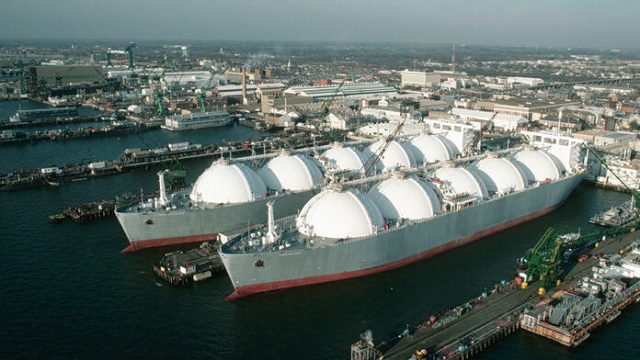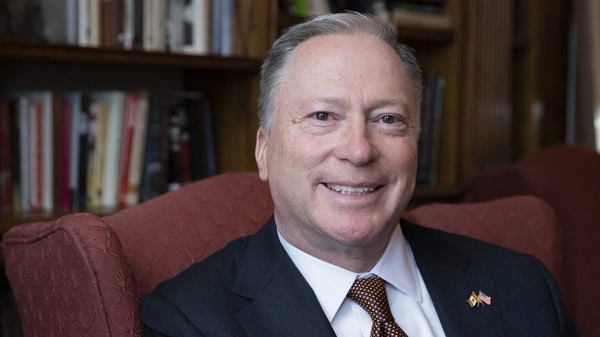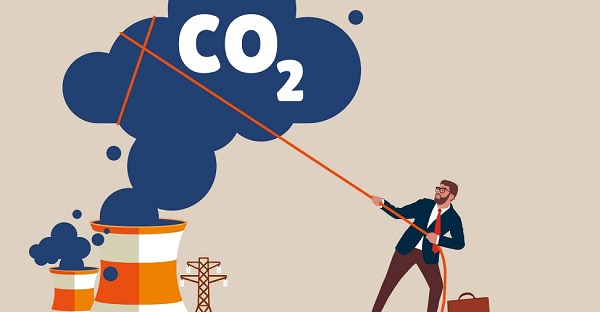Energy
Texas Legislative Committee Proposes Ways to Protect, Expand LNG Industry

From Heartland Daily News
By Bethany Blankley
“the Biden Administration’s federal permitting pause during a presidential election year appears to be purely political in nature and an attempt to disrupt Texas’ booming economy, now the eighth largest economy in the world…. it is abundantly clear American LNG is in the best interest of the Texas economy, local communities, our national security, and global energy security.”
A state legislative committee is proposing ways to expand Texas’ liquified natural gas (LNG) industry after the Biden administration announced it was pausing pending applications for LNG exports that would significantly impact Texas.
The Texas House Select Committee on Protecting Texas LNG Exports issued its findings after holding a hearing on the topic earlier this month. Led by state Rep. Jared Patterson, R-Frisco, the report states, “the Biden Administration’s federal permitting pause during a presidential election year appears to be purely political in nature and an attempt to disrupt Texas’ booming economy, now the eighth largest economy in the world.
“It has caused long-term uncertainty for both investors and allied nations around the world relying on American energy, particularly in Europe as they seek to wean themselves off Russian natural gas. After multiple studies across Democratic and Republican presidential administrations, it is abundantly clear American LNG is in the best interest of the Texas economy, local communities, our national security, and global energy security.”
House Speaker Dade Phelan, R-Beaumont, created the select committee and charged it with evaluating the impact on the Texas LNG industry and to propose actions the state legislature could take in the next legislative session to protect it.
Phelan’s district is critical to the oil and natural gas industry. It encompasses a region known as the “Golden Triangle,” rich in oil and natural gas production, processing, refining and exports in the southeast towns of Beaumont, Port Arthur and Orange. It includes a key LNG export terminal currently under construction in Port Arthur, where several LNG facilities are also located.
The LNG terminal, once completed and operational, is expected to have an export capacity of 13 million tons a year. With access to the Gulf of Mexico through the Sabine-Neches ship channel, it represents a $13 billion investment in new energy infrastructure, the report states.
The U.S. leads the world in LNG exports, led by the Gulf states of Texas and Louisiana. In 2017, the U.S. became a net exporter of natural gas for the first time since 1957, “primarily because of increased LNG exports,” according to the EIA. The U.S. became a net exporter after Cheniere Energy was the first to export domestically sourced LNG from the Sabine Pass LNG Terminal in Cameron Parish, Louisiana, and from the Port of Corpus Christi in Texas, The Center Square first reported.
Nearly 25% of U.S. natural gas reserves are located in Texas and 30% of the largest hundred natural gas fields in the U.S. are in Texas, the legislative report notes, citing state data. It also identifies six LNG facilities nationwide that would be impacted by the ban, including two in Texas, in Port Arthur and Corpus Christi.
Texas ports, including Port Arthur and Corpus Christi, are among the top ports in the U.S. leading in foreign trade impact, and the Port of Corpus Christi continues to break records in tonnage, primarily due to oil and LNG exports, The Center Square reported.
Texas Oil & Gas Association Chief Economist Dean Foreman, who testified before the committee, said, “Texas and Louisiana bear the brunt of short-sighted federal policies that jeopardize LNG export projects, representing potential investments of $200 billion across the value chain, including a projected 20% increase in Texas’ dry natural gas production.
“The reasons given for this pause – concerns about higher domestic natural gas prices, emissions, and community impacts – are clearly unfounded. U.S. LNG exports have responded to global demand, driving domestic innovation that enhances productivity and reduces consumer costs. LNG has replaced coal in power generation, emerging as a primary driver of emission reductions, and have catalyzed economic growth across the Gulf Coast. On all accounts, U.S. LNG exports have proven to be decisively beneficial.”
Two key claims the administration made for implementing the ban (LNG exports increase domestic energy costs and increase methane emissions) have been refuted, The Center Square first reported. A bipartisan coalition of Texas’ congressional delegation called on the president “to refocus on policies that support US LNG,” understanding that Texas is the energy capital of the United States, The Center Square reported. Sixteen states, led by Louisiana and Texas, also sued, arguing the ban is illegal.
The committee recommended that the legislature “consider legislation and policies authorizing the governor to develop and execute an interstate compact with the goal of sharing state information, resources, and services with other interested states seeking to protect and grow the LNG industry along the Gulf Coast.”
It also recommends that the legislature propose legislation and policies to permit temporary eligibility of LNG facility construction grants and loans when federal permitting pauses occur; provide economic incentives for LNG facilities to counter market consequences of a federal permitting pause; reform specific permitting regulations and increase overall permitting process efficiency; expand funding for project construction and development through the Texas Department of Transportation’s Maritime Infrastructure Program; increase workforce grants made available through local colleges to meet workforce demands for construction and facility operations; and mandate that official reports be published every year providing data on the “relevance and importance of the LNG industry regarding the public interest.”
Bethany Blankley is a contributor at The Center Square.
Originally published by The Center Square. Republished with permission.
Business
Major Projects Office Another Case Of Liberal Political Theatre

From the Frontier Centre for Public Policy
By Lee Harding
Ottawa’s Major Projects Office is a fix for a mess the Liberals created—where approval now hinges on politics, not merit.
They are repeating their same old tricks, dressing up political favouritism as progress instead of cutting barriers for everyone
On Sept. 11, the Prime Minister’s Office announced five projects being examined by its Major Projects Office, all with the potential to be fast-tracked for approval and to get financial help. However, no one should get too excited. This is only a bad effort at fixing what government wrecked.
During the Trudeau years, and since, the Liberals have created a regulatory environment so daunting that companies need a trump card to get anything done. That’s why the Major Projects Office (MPO) exists.
“The MPO will work to fast-track nation-building projects by streamlining regulatory assessment and approvals and helping to structure financing, in close partnership with provinces, territories, Indigenous Peoples and private investors,” explains a government press release.
Canadians must not be fooled. A better solution would be to create a regulatory and tax environment where these projects can meet market demand through private investment. We don’t have that in Canada, which is why money has fled the country and our GDP growth per capita is near zero.
Instead of this less politicized and more even-handed approach, the Liberals have found a way to make their cabinet the only gatekeepers able to usher someone past the impossible process they created. Then, having done so, they can brag about what “they” got done.
The Fraser Institute has called out this system for its potential to incentivize bribes and kickbacks. The Liberals have such a track record of handing out projects and even judicial positions to their friends that such scenarios become easier to believe. Innumerable business groups will be kissing up to the Liberals just to get anything major done.
The government has created the need for more of itself, and it is following up in every way it can. Already, the federal government has set up offices across Canada for people to apply for such projects. Really? Anyone with enough dollars to pursue a major project can fly to Ottawa to make their pitch.
No, this is as much about the show as it is about results—and probably much more. It is all too reminiscent of another big-sounding, mostly ineffective program the Liberal government rolled out in 2017. They announced a $950-million Innovation Superclusters Initiative “designed to help strengthen Canada’s most promising clusters … while positioning Canadian firms for global leadership.”
That program allowed any company in the world to participate, with winners getting matching dollars from taxpayers for their proposals. (But all for the good of Canada, we were told.) More than 50 applications were made for these sweepstakes, which included more than 1,000 businesses and 350 other participants. In Trudeau Liberal fashion, every applicant had to articulate how their proposal would increase female jobs and leadership and encourage diversity in the long term.
The entire process was like one big Dragon’s Den series. The Liberals trotted out a list of contestants full of nice-sounding possibilities, with maximum hype and minimal reality. Late in the process, Minister of Innovation, Science and Industry Navdeep Bains picked the nine finalists himself (all based in cities with a Liberal MP), from which five would be chosen.
The alleged premise was to leverage local and regional commercial clusters, but that soon proved ridiculous. The “Clean, Low-energy, Effective and Remediated Supercluster” purported to power clean growth in mining in Ontario, Quebec and Vancouver. Not to be outdone, the “Mobility Systems and Technologies for the 21st Century Supercluster” included all three of these locations, plus Atlantic Canada. They were only clustered by their tendency to vote Liberal.
Today, the MPO repeats this virtue-signalling, politicking, drawn-out, tax-dollar-spending drama. The Red Chris Mine expansion in northwest British Columbia is one of the proposals under consideration. It would be done in conjunction with the Indigenous Tahltan Nation and is supposed to reduce greenhouse gas emissions by 70 per cent. That’s right up the Liberal alley.
Meanwhile, the project is somehow part of a proposed Northwest Critical Conservation Corridor that would cordon off an area the size of Greece from development. Is this economic growth or economic prohibition? This approach is more like the United Nations’ Agenda 2030 than it is nation-building. And it is more like the World Economic Forum’s “stakeholder capitalism” approach than it is free enterprise.
At least there are two gems among the five proposals. One is to expand capacity at the Port of Montreal, and another is to expand the Canada LNG facility in Kitimat, B.C. Both have a market case and clear economic benefits.
Even here, Canadians must ask themselves, why must the government use a bulldozer to get past the red tape it created? Why not cut the tape for everyone? The Liberals deserve little credit for knocking down a door they barred themselves.
Lee Harding is a research fellow for the Frontier Centre for Public Policy.
Alberta
Enbridge CEO says ‘there’s a good reason’ for Alberta to champion new oil pipeline

Enbridge CEO Greg Ebel. The company’s extensive pipeline network transports about 30 per cent of the oil produced in North America and nearly 20 per cent of the natural gas consumed in the United States. Photo courtesy Enbridge
From the Canadian Energy Centre
B.C. tanker ban an example of federal rules that have to change
The CEO of North America’s largest pipeline operator says Alberta’s move to champion a new oil pipeline to B.C.’s north coast makes sense.
“There’s a good reason the Alberta government has become proponent of a pipeline to the north coast of B.C.,” Enbridge CEO Greg Ebel told the Empire Club of Canada in Toronto the day after Alberta’s announcement.
“The previous [federal] government’s tanker ban effectively makes that export pipeline illegal. No company would build a pipeline to nowhere.”
It’s a big lost opportunity. With short shipping times to Asia, where oil demand is growing, ports on B.C.’s north coast offer a strong business case for Canadian exports. But only if tankers are allowed.
A new pipeline could generate economic benefits across Canada and, under Alberta’s plan, drive economic reconciliation with Indigenous communities.
Ebel said the tanker ban is an example of how policies have to change to allow Canada to maximize its economic potential.
Repealing the legislation is at the top of the list of needed changes Ebel and 94 other energy CEOs sent in a letter to Prime Minister Mark Carney in mid-September.
The federal government’s commitment to the tanker ban under former Prime Minister Justin Trudeau was a key factor in the cancellation of Enbridge’s Northern Gateway pipeline.
That project was originally targeted to go into service around 2016, with capacity to ship 525,000 barrels per day of Canadian oil to Asia.
“We have tried to build nation-building pipelines, and we have the scars to prove it. Five hundred million scars, to be quite honest,” Ebel said, referencing investment the company and its shareholders made advancing the project.
“Those are pensioners and retail investors and employees that took on that risk, and it was difficult,” he said.
For an industry proponent to step up to lead a new Canadian oil export pipeline, it would likely require “overwhelming government support and regulatory overhaul,” BMO Capital Markets said earlier this year.
Energy companies want to build in Canada, Ebel said.
“The energy sector is ready to invest, ready to partner, partner with Indigenous nations and deliver for the country,” he said.
“None of us is calling for weaker environmental oversight. Instead, we are urging government to adopt smarter, clearer, faster processes so that we can attract investment, take risks and build for tomorrow.”
This is the time for Canadians “to remind ourselves we should be the best at this,” Ebel said.
“We should lead the way and show the world how it’s done: wisely, responsibly, efficiently and effectively.”
With input from a technical advisory group that includes pipeline leaders and Indigenous relations experts, Alberta will undertake pre-feasibility work to identify the pipeline’s potential route and size, estimate costs, and begin early Indigenous engagement and partnership efforts.
The province aims to submit an application to the Federal Major Projects Office by spring 2026.
-

 Energy2 days ago
Energy2 days agoIndigenous Communities Support Pipelines, Why No One Talks About That
-

 Alberta2 days ago
Alberta2 days agoOil Sands are the Costco of world energy – dependable and you know exactly where to find it
-

 Business2 days ago
Business2 days agoFinance Committee Recommendation To Revoke Charitable Status For Religion Short Sighted And Destructive
-

 International2 days ago
International2 days agoNumber of young people identifying as ‘transgender’ declines sharply: report
-

 Alberta2 days ago
Alberta2 days agoThe Technical Pitfalls and Political Perils of “Decarbonized” Oil
-

 National18 hours ago
National18 hours agoDemocracy Watch Renews Push for Independent Prosecutor in SNC-Lavalin Case
-

 Health2 days ago
Health2 days agoColorado gave over 500 people assisted suicide drugs solely for eating disorders in 2024
-

 Censorship Industrial Complex1 day ago
Censorship Industrial Complex1 day agoCanada’s privacy commissioner says he was not consulted on bill to ban dissidents from internet






